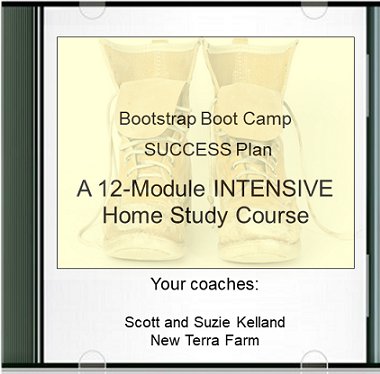Farm Hurdles Facing The Prospective New Farmer
I've written a lot about small farming as a way of life; I can't imagine not being on New Terra Farm and doing what I do. Despite some problems, and even a few failures, we've been pretty happy here for a decade. But, not everyone who jumps into farming is as lucky as we were. Here are a few farm hurdles to think about before making the leap to your own piece of paradise.
Farm Hurdle 1: Compatible visions. Make sure each partner is 'on board' with the move, and that there is a common understanding of the goals of the farm. I personally know two couples that split up because of different visions and goals for their farm; we bought New Terra Farm from one of them.
It will not be a happy home if the partners disagree about their goals the farm. Don't jump into farming without agreement on these issues.
Farm Hurdle 2: Read the fine print. I know a couple who's farm dream came to an end because of the difference between 'rural' zoning and 'agricultural' zoning. Don't take anyone's word for what you can and can't do on your property, including that of your real estate agent. Get a copy of the zoning by-laws, and talk to the zoning officer before purchase.
Farm Hurdle 3: Make sure you know what you are buying. New Terra Farm sits on a narrow belt of Class One farmland. I have 3 or 4 feet of very fertile clay-loam topsoil all over the property. Farms as close as 1 kilometer to me have a foot or less of topsoil, because they are outside this belt. Find out what your soil is like; getting a soil test done is a good idea too.
Farm Hurdle 4: Have a plan. Before you invest in anything on your farm, have a clear idea of how it will pay you back. I have a friend who bought a beautiful farm property just after I did. He spent a LOT of money on farm equipment, including several tractors, mowers, balers, and cultivation equipment. And a few toys like his-and-hers four-wheelers.
The idea was to do custom work to generate an income. This didn't work out; his prices didn't cover his expenses and generate enough profit to maintain the equipment. The market for his services was not as large as he had hoped. And, just owning equipment doesn't mean you know how to use it effectively; customers get annoyed if they think you are learning on the job at their expense.
Bottom line, any farm business needs a business plan, and any investment should be subject to cost-benefit analysis. And, have a realistic idea of your own skills before proceeding. Which brings me to the next point . . .
Farm Hurdle 5 – there WILL be a learning curve. Farming is a complex business; it's unlikely that you will come from the city equipped with all the skills you will need to 'make it'. You have to allow for the learning curve; don't bet the farm (literally) on launching a huge, successful, farm-based business in Year 1.
Allan Nation of Stockman GrassFarmer fame says, start by just feeding yourself. Then, grow for a couple interested friends and neighbours. Then try it commercially on a small scale, and finally commit to a larger enterprise, using lessons learned from the first three stages.
This approach might seem slow, but it's faster than losing everything and having to start over.
Don't let these farm hurdles discourage you, this is a great life. But just like any new endeavour, you have to do your homework. They say the crisis you plan for never happens, so spend the time to make a good plan.
New for 2020: Get my FREE One-Acre Farm Plan and learn how to pigs, chickens and more, integrated with an organic market garden, to make more money from your small property.
Imagine building a profitable and sustainable mini-farm even on a small piece of land.
Enter your email address and your free report will be sent to you right away.
 Build a real plan for SUCCESS on your small property
Build a real plan for SUCCESS on your small propertyBeing a good grower is only part of the answer to success. You also have to:
- Know how to plan and manage your business;
- Persuade others of the value of your products;
- Maintain financial stability; and,
- Stay motivated through your journey to small farm success.
The Bootstrap Boot Camp Success Plan course will teach you all this and more. Now just $97 $37 only from New terra Farm.
- Home Page ›
- 5 Acre Farm ›
- Farm Hurdles
Recent Articles
-
Farm training for the new or wannabe farmer
Jan 02, 26 10:38 AM
Practical farm training from award-winning New Terra Farm -
Farm grown reviews of products recommended by New Terra Farm
Dec 04, 25 06:26 AM
Find great farm and garden products in my farm grown reviews -
Best Chicken Coop and Accessories for Small Farms and Homesteads
Nov 30, 25 09:18 AM
Looking for the best chicken coop? Here are the top coops, accessories, nest boxes, and gear to build a safe, productive poultry setup.









